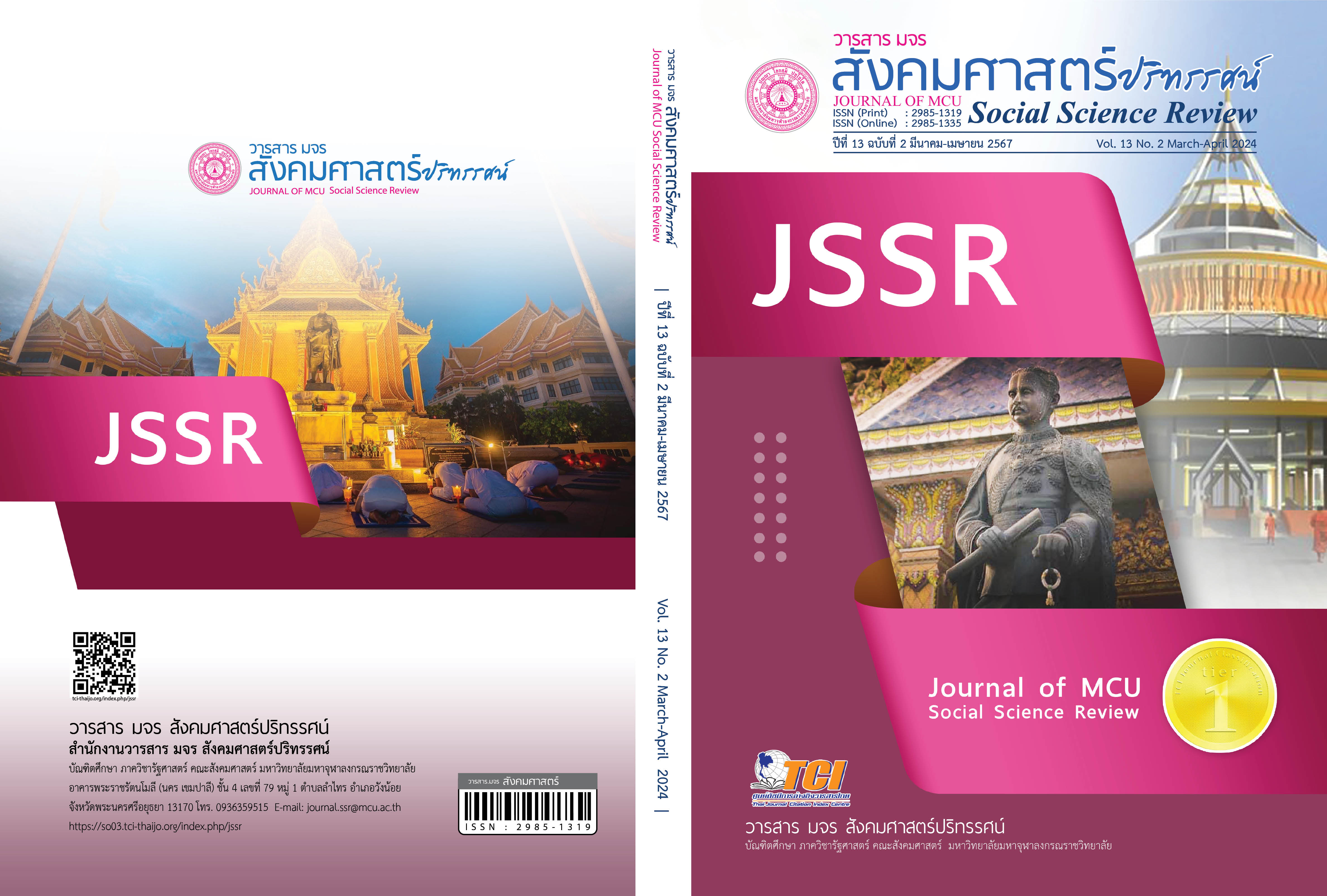บทบาทของวัดในการบริหารจัดการฌาปนสถานและงานศพในจังหวัดนนทบุรี
คำสำคัญ:
บทบาท, การบริหารจัดการ, ฌาปนสถาน, งานศพบทคัดย่อ
บทความวิชาการมุ่งศึกษา บทบาทของวัดในการบริหารจัดการฌาปนสถานและงานศพในจังหวัดนนทบุรี โดยศึกษาจากเอกสาร ตำรา หนังสือ วิทยานิพนธ์ อินเทอร์เน็ต และจากการวิเคราะห์สังเคราะห์
ผลการศึกษาพบว่า 1. วัดโดยคณะสงฆ์มีบทบาทสำคัญในการพัฒนาชุมชนและช่วยเหลือประชาชนจำเป็นจะต้องปรับตัวในการที่จะบริหารจัดการฌาปนสถานและงานศพให้เกิดความเรียบร้อย ตามหลักการบริหาร 4M ประกอบด้วยการที่มีคนที่จะพร้อมในการปฏิบัติหน้าที่ มีงบประมาณ วัสดุอุปกรณ์ มีการจัดการที่มีประสิทธิภาพบริหารทรัพยากรมนุษย์ ทรัพยากรที่มีภายในวัด ให้เกิดคุณค่า เพื่อบริหารความพึงพอใจของประชาชนที่มาใช้บริการ เพราะวัดถือว่าเป็นสถานที่ที่เป็นที่พึ่งทางจิตใจของประชาชน ส่งผลจะทำให้ปัจจัยส่วนอื่นเกิดขึ้นอย่างเช่น การเดินทาง การมีที่จอดรถ มีศาลาบำเพ็ญกุศล มีเป็นเผาศพ 2. การบริหารจัดการฌาปนกิจสถานและจัดงานศพในจังหวัดนนทบุรีถือว่าอยู่ในด้านสาธารณสงเคราะห์และสาธารณูปการไปด้วยเพราะนอกจากจะเป็นการสงเคราะห์ประชาชนในเรื่องของการจัดงานในวัดแล้วยังเป็นการจัดบริเวณสถานที่ต้อนรับและอำนวยความสะดวกให้แก่ประชาชนอยู่ในด้านสาธารณูปการไปด้วย 3. บทบาทของสัปเหร่อที่มีต่อพิธีศพจึงเป็นพฤติกรรมการปฏิบัติตามบทบาทหน้าที่ที่ได้รับตำแหน่งทางสังคมหรือกิจกรรม และภาระหน้าที่ที่มีความเกี่ยวข้อง
เอกสารอ้างอิง
ไทยพับลิก้า. (2560). ธุรกิจงานศพ : จัดงาน 7 วัดดัง กทม. โปรดนับเงินในกระเป๋าก่อน (2). สืบค้น 26 มกราคม 2567, จาก https://thaipublica.org/2011/09/funerals2/
แปลก สนธิรักษ์. (2531). พิธีกรรมและประเพณี. กรุงเทพฯ: เจริญจิต.
พระขวัญเมือง สุหะ. (2546). พุทธศาสนากับลัทธิบริโภคนิยมศึกษาเปรียบเทียบเศรษฐศาสตร์แนวพุทธกับเศรษฐศาสตร์กระแสหลัก (วิทยานิพนธ์อักษรศาสตรมหาบัณฑิต สาขาวิชาศาสนาเปรียบเทียบ). นครปฐม: มหาวิทยาลัยมหิดล.
พระครูสมุห์ประสงค์ ฐิตปุญฺโญ. (2541). สังเค็ด ราชวัติ ดอกไม้ธูปเทียน และประเพณีทำศพ. กรุงเทพฯ: วิริยพัฒนา.
พวงผกา ประเสริฐศิลป์. (2542). ประเพณีไทยกับการเปลี่ยนแปลงตามกระแสวัฒนธรรมโลก. กรุงเทพฯ: สถาบันราชภัฏสวนดุสิต.
ภัสน์วจี ศรีสุวรรณ์. (2557). ฉลาดทำศพ (พิมพ์ครั้งที่ 2). กรุงเทพฯ: ห้างหุ้นส่วนจำกัดสามลดา.
มหาจุฬาลงกรณราชวิทยาลัย. (2539). พระไตรปิฎกภาษาไทย ฉบับมหาจุฬาลงกรณราชวิทยาลัย. กรุงเทพฯ: โรงพิมพ์มหาจุฬาลงกรณราชวิทยาลัย.
ยุวดี ช่วยกิจ. (2551). ความสัมพันธ์ระหว่างแนวคิดทางการตลาดของฟิลลิป คอตเลอร์ กับลัทธิ บริโภคนิยม (วิทยานิพนธ์ศิลปศาสตรมหาบัณฑิต สาขาวิชาปรัชญา). เชียงใหม่: มหาวิทยาลัยเชียงใหม่.
ลักขณา ศกุนะสิงห์. (2556). ความเชื่อและประเพณี: เกิด แต่งงาน ตาย. กรุงเทพฯ: พราวเพรส.
วัดชลประทานรังสฤษดิ์ พระอารามหลวง. (2567). สุคติสถาน. สืบค้น 26 มกราคม 2567, จาก https://golink.icu/a43WxhV
เสถียร โกเศศ. (2531). การตาย. กรุงเทพฯ: แม่คำผาง.
ดาวน์โหลด
เผยแพร่แล้ว
รูปแบบการอ้างอิง
ฉบับ
ประเภทบทความ
สัญญาอนุญาต
ลิขสิทธิ์ (c) 2024 วารสาร มจร สังคมศาสตร์ปริทรรศน์

อนุญาตภายใต้เงื่อนไข Creative Commons Attribution-NonCommercial-NoDerivatives 4.0 International License.
เพื่อให้เป็นไปตามกฎหมายลิขสิทธิ์ ผู้นิพนธ์ทุกท่านต้องลงลายมือชื่อในแบบฟอร์มใบมอบลิขสิทธิ์บทความให้แก่วารสารฯ พร้อมกับบทความต้นฉบับที่ได้แก้ไขครั้งสุดท้าย นอกจากนี้ ผู้นิพนธ์ทุกท่านต้องยืนยันว่าบทความต้นฉบับที่ส่งมาตีพิมพ์นั้น ได้ส่งมาตีพิมพ์เฉพาะในวารสาร มจร สังคมศาสตร์ปริทรรศน์ เพียงแห่งเดียวเท่านั้น หากมีการใช้ภาพหรือตารางหรือเนื้อหาอื่นๆ ของผู้นิพนธ์อื่นที่ปรากฏในสิ่งตีพิมพ์อื่นมาแล้ว ผู้นิพนธ์ต้องขออนุญาตเจ้าของลิขสิทธิ์ก่อน พร้อมทั้งแสดงหนังสือที่ได้รับการยินยอมต่อบรรณาธิการ ก่อนที่บทความจะได้รับการตีพิมพ์ หากไม่เป็นไปตามข้อกำหนดเบื้องต้น ทางวารสารจะถอดบทความของท่านออกโดยไม่มีข้อยกเว้นใดๆ ทั้งสิ้น





